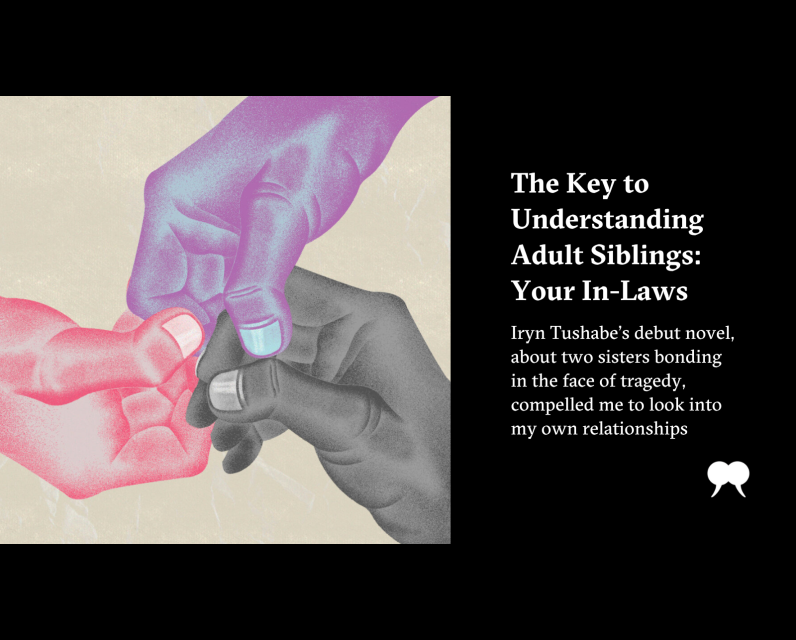Source Feed: Walrus
Author: Anubha Momin
Publication Date: July 4, 2025 - 06:25
The Key to Understanding Adult Siblings: Your In-Laws
July 4, 2025

J ust leave it
Don’t call him
Two consecutive texts from my aunt, following a series of messages in which she told me that my mother, who is in her mid-sixties, was dizzy, throwing up, and unable to open her eyes. That Mum might need to go to the emergency room and that my aunt needed help. The “him” in question was my brother Ornab, thirty-seven years old and two years younger than me. My aunt’s flurry of thoughts came to me on the last day of January this year, around 7 p.m. in Paris, where I live, from Toronto, still in its afternoon.
Ornab lives fifteen minutes from my mum and my aunt, literally in a better place to step up in an emergency. My little brother, my first best friend, who a week earlier had told me that he thought he needed to go on antidepressants. I didn’t know if my aunt knew this. Was that why she instructed me not to call him?
Acutely, my concern was for my mother (she was, is, fine and was, is, well taken care of), but just below that, lapping gently against my feeling of being so far, too far, was a crawling fear for my brother.
Don’t call him
And I didn’t. I called my sister-in-law.
I ryn Tushabe’s debut novel, Everything Is Fine Here, is about two sisters, but the keystone character is a sort of sister-in-law. Aine Kamara, a sometimes diffident eighteen-year-old, is the protagonist and younger sister of the much older Mbabazi, a sanguine yet reticent medical doctor. After two years apart, during which Mbabazi was in Canada for school, the siblings reunite in Uganda, finding each other again when Mbabazi is invited to speak at Aine’s boarding school. This is when Aine meets Achen, the long-term girlfriend Mbabazi never mentioned to her younger sister. Soon thereafter, desperate to reach her sister during a family emergency, Aine uses her mother’s phone to call the one person who would know how to reach her: Achen.
In April 2024, Uganda’s highest court upheld the Anti-Homosexuality Act, which is considered one of the harshest anti-gay laws in the world. The act criminalizes consensual acts of homosexuality, with punishments from ten years in prison to the death penalty. Despite this terrifying context, Tushabe avoids writing Everything Is Fine Here as a gay trauma narrative; instead, she allows other stories to take centre stage. In the lead is the friendship between Aine and Achen and, in particular, the ways Achen—an open book and an empath—helps Aine fill in the blanks left by her elusive, secretive sister. Mbabazi, who “would rather walk barefooted over burning embers” than be upfront with Aine, is developed patiently through their eyes. As Aine and Achen mirror one another, they reflect back versions of Mbabazi.
Tushabe’s wonderful short stories have brought her awards and recognition, including the 2023 Writers’ Trust McClelland & Stewart Journey Prize, making Everything Is Fine Here an anticipated first novel. The story is straightforward, but there is a lot of plot and many players in Everything Is Fine Here, leaving less space for interiority—or, more plainly, character development. While the novel lacks the inviting pace and introspection of her earlier works, what Tushabe continues to do well is portray dynamics between people, in a way that particularly touched me, because she compelled me to look in on my own relationships, especially the one with my (also sort of) sister-in-law.
T echnically, Natasha is not my sister-in-law. She and Ornab have never married. In the nearly nine years since their meet cute on a Via Rail train, they have enacted commitment rather than pledging it on paper: the purchase of a home, the creation of my niece. It works for them, and it’s enough for me too.
My sister-in-law. The first-person possessive determiner highlights a direct connection between us (she calls me this too), removing the middleman from the perhaps more legally correct alternatives: my brother’s girlfriend, my brother’s partner. This is what I say to people when I give Natasha the title and they question it, pointing out that my sibling isn’t married. Our relationship exists for and belongs to us, I explain, which sounds nice, and feminist, and is not untrue. But even if not centred, my brother is always present, in the “in-law,” the undercurrent of our union. Ornab was the bridge that brought me to her, and over time, she has become a bridge in the other direction.
And so I called the woman I call my sister-in-law that January evening, her afternoon, because though I have known my brother his whole life, she knows him best. She doesn’t need a biweekly FaceTime update to know the depth of Ornab’s depression, how it festers, how it fades. And for that, I am so grateful.
“Ornab’s right here. He’s fine,” she answered. “Let me put you on speakerphone.”
P eeled back, there is a central kernel of intimacy in Tushabe’s novel: the insistent, surprising ways characters connect even amidst the pressurization of Uganda’s rigid anti-homosexuality laws.
Chosen family is of great importance in queer communities: non-biological kin selected for love, joy, and reciprocity. Other groups make this selection too—anyone at the fringes of their society or, in the case of Aine, young people at odds with the outdated views of their parents. Leaning into Mbabazi and Achen means pulling away from her homophobic mother in particular.
Aine and I got lucky with our sort of sisters. All four of us—Achen and Aine, Natasha and myself—are storytellers: a podcaster, a budding journalist, a playwright, and a sporadic writer respectively. Aine can barely stand to hear her sister detail her work in gynecology, but she seeks out Achen’s podcast, just as Achen reads Aine’s surprising manifesto on Christianity in the local paper. Their work gives them easy access points to understanding one another, as well as a shared language of creation. As the two women spend time together, it becomes clear: they have more in common with each other than they do with Mbabazi. You could say the same for me and Natasha and Ornab.
I’ve joked that I trained Ornab for a girlfriend like Natasha. Both she and I are eldest daughters (read: bossy), both very social and chatty and optimistic. She’s a year older than me, and we have mutual friends. It goes deeper, of course. Natasha and I have been major emotional pillars for our families, in general and during incredibly trying times. We’ve grown up to apply these skills to our adult relationships, romantic or otherwise. There’s an intensity to her that I identify with—high expectations completely focused on interiority: the why of who we are.
I am absolutely giving big-sister energy by taking credit for my brother’s healthy relationship, but my conceit may have some merit. Two different research groups at Penn State University found a correlation between sibling dynamics and adult romantic relationships. For example, adolescents who reported higher levels of closeness with their siblings tended to experience greater empowerment in their romantic relationships during late adolescence and adulthood. As adults, we replicate patterns from youth. We look for people who remind us of safety.
“I could only stay in Canada if you were there with me,” Mbabazi says. “You and Achen.”
Every once in a while, the otherwise non-committal, somewhat selfish Mbabazi makes such a declaration. Each time, Aine is grateful—and surprised. She isn’t on solid ground in her relationship with Mbabazi. Achen, however, remains steadfast, prioritizing Aine. As Aine’s life overlaps more and more with her sister’s and Achen’s, she begins to explore her first intimate-partner relationships, including with Elia, who is Mbabazi’s age. In another example of Mbabazi’s self-centredness, she disapproves of this crush because of how it makes her feel: “You cannot fancy him, Aine,” Mbabazi commands. “He’s one of my closest friends. It would be too weird.” She says this despite the fact that Aine stands by her lesbian union, facing down family, society, and the law.
Like Mbabazi, I have spent a lot of time away from my family and my hometown. A first notable break lasted the seven years I split between studying in the UK, travelling as a nomad, and boo’d up in Iqaluit, after which I eased, slowly, back into living in Toronto. I was in transition, post-breakup, post-move, a shaky ball of energy looking for sense, trying to replace stability, seeking validation. I was living semi-nomadically and trying out a new industry, a new avenue for myself as a writer. And it was when, for the first time in our actually adult lives, Ornab and I found ourselves at odds with one another.
I can’t quite explain the discord between myself and Ornab. I know that I once called him from the corner of South Beverly Drive and Wilshire Boulevard in Los Angeles, hopped up on the naive excitement of a new writer having a very positive meeting with a manager from a major Hollywood agency. I remember him responding with silence, and then—even worse—a dismissive “Okay.” I hung up and I deflated into sobs. Years later, I understand that in that moment, and in others during this erratic period of my life, he was worried and out of his depth—and that I was having fun, and I was scared, and I was (I would argue necessarily) selfish.
This is, I think, pretty standard sibling stuff. You can’t really know someone nearly thirty years and not have friction. But we were lopsided in a specific way that I am only now, after reading Tushabe’s novel, considering: for the near decade my brother and my sister-in-law have been together, I have been single. The dissolution of my long-term union and their adorable train meeting happened in the same summer. I got Natasha; Ornab got no one.
Romantic partners are not the only people who can form bridges between siblings, but they are often integrated into your family in a very strong, meaningful way. In our case, Natasha has become the only other family member in my age range. She’s also a Westerner, raised in Canada, like me and Ornab, something we don’t have in common with anyone else in our family. It gives us shorthand and shared cultural touchpoints. Aine has this too, with Achen, who, unlike Aine and Mbabazi’s parents, is educated, worldly.
I know not everyone has this experience with in-laws, nor with their siblings. Like Achen for Aine, Natasha acts sometimes as a litmus test, sometimes an interpreter of sibling moods. I am most indebted to her for showing Ornab, better than I ever could, that he deserves love and to be loved even as he is struggling to love himself. The presence of these women—Achen and Natasha—gives us—Aine and myself—an advantage that our sister and brother—Mbabazi and Ornab—don’t have: a secondary pathway to reach our siblings.
Ornab’s right here. He’s fine.
Does he ever want to double-check with someone that I’m fine too?The post The Key to Understanding Adult Siblings: Your In-Laws first appeared on The Walrus.
After an emotional four-game sweep of the visiting New York Yankees, the Toronto Blue Jays could have easily experienced the old hangover effect.
July 4, 2025 - 23:43 | Globalnews Digital | Global News - Ottawa
A throwing error that travelled down the first-base line from Los Angeles Angels reliever Sam Bachman on an Ernie Clement bunt gave the Toronto Blue Jays a 4-3 walk-off win on Friday.
July 4, 2025 - 22:29 | Globalnews Digital | Global News - Ottawa
“Each owner had to come up with that money to redo the full envelope of the building,” Susan Hisch said. “And still — nothing’s done.”
July 4, 2025 - 20:31 | Victoria Femia | Global News - Canada




Comments
Be the first to comment